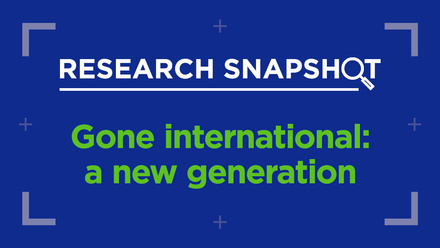Beyond rankings: How smaller countries can rethink international student recruitment

When it comes to attracting international students, smaller countries often face a tough reality. Global rankings, flashy marketing campaigns, and the convenience of online learning tend to favour large, well-established higher education institutions. Countries like Armenia — with still developing global visibility, might feel sidelined in this competitive landscape.
But that doesn’t mean smaller players are out of the game. Quite the opposite. In fact, there are distinct strengths that smaller countries can harness to appeal to students who are looking for more than just a prestigious diploma. Many students today want meaningful connections, affordability, and a sense of purpose in their education — all areas where small countries can shine.
Working in internationalisation at a state university in Armenia, I’ve had the chance to witness how we can use these advantages effectively. Here are a few thoughts based on our ongoing experience at the National Polytechnic University of Armenia (NPUA), that can possibly inform and inspire other institutions.
Many students today want meaningful connections, affordability, and a sense of purpose in their education — all areas where small countries can shine.
1. Shifting the focus: From prestige to purpose
Big-name higher education institutions have the benefit of global brand recognition. That’s a fact. But rather than chasing the same kind of prestige, smaller institutions can distinguish themselves by offering relevance and purpose.
Our experience with international students has proven that students appreciate when they can be part of something that matters. Many of our programmes now have a strong focus on sustainable development, innovation, and entrepreneurship. It is essential to encourage students to contribute to projects that make a difference both locally and globally. That sense of involvement is something they value deeply.
2. More affordable, more personal
It’s no secret that cost plays a huge role in a student’s decision to study abroad. Smaller countries usually, offer more affordable tuition and living costs. That affordability can open doors for students from regions where studying abroad might otherwise be out of reach.
But it’s not just about costs. The experience is often more personal. At smaller institutions like ours, , international students are part of the community. They know their professors, they take part in research from the early stages, and they’re not just another number. That kind of engagement is hard to replicate at larger institutions, and it can make a real difference in a student’s experience.
3. Finding the niche instead of trying to be everything
Rather than attempting to cover every academic field, smaller institutions need to concentrate on areas where they have unique value. Armenia, for example, has the potential to become a hub for topics like sustainable mountain development, regional innovation in post-Soviet countries, and green technologies adapted to local realities.
By focusing on these niche areas, we’re not just playing to our strengths — we’re attracting students who are specifically interested in what we can offer. That kind of targeted approach often speaks louder than a general "we do everything" message.
4. Partnering to grow visibility
Let’s face it — small institutions rarely have big budgets for international promotion. It is therefore essential to lean on partnerships instead. At our university for example, through EU programmes like Erasmus+ we’ve been able to build relationships, boost mobility, and establish trust with partners abroad.
These collaborations help spread the word more effectively than paid ads ever could. We also involve our alumni and diaspora in this effort. When former students share their positive experiences, it resonates in a way that no brochure can match.
5. Blending online and on-site: A flexible path forward
Rather than seeing online education as competition, we’re starting to see it as an opportunity. Hybrid models — where students start with online courses and then join us on campus for short-term experiences — have shown real promise.
This format is especially appealing to students who might be hesitant about relocating or who are testing whether a full programme abroad is right for them. It also makes programmes more accessible to working professionals or students from lower-income backgrounds.
Conclusion: Small doesn’t mean limited
Just because a country isn’t home to world-famous institutions doesn’t mean it can’t offer a powerful, valuable international education experience. Small countries like Armenia can lead with authenticity, connection, and purpose.
In today’s changing higher education landscape, that might be exactly what many international students are looking for. They’re not just applying to a higher education institution — they’re looking for a place where they can grow, contribute, and belong. And if we offer that honestly and clearly, there’s no reason we can’t stand out.
Just because a country isn’t home to world-famous institutions doesn’t mean it can’t offer a powerful, valuable international education experience. Small countries like Armenia can lead with authenticity, connection, and purpose.






